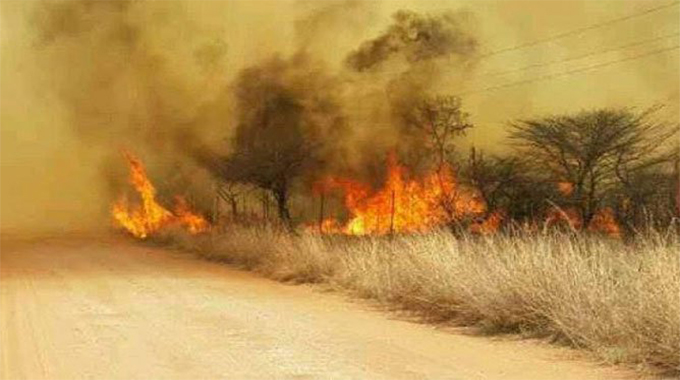
Andile Tshuma, Chronicle Correspondent
THE Environmental Management Agency (Ema) has warned the public to be vigilant as the fire season in the country starts.
The authority targets to reduce runaway fire incidents by 25 percent this year.
Veld fires remain a major driver of land degradation in Zimbabwe, with the country losing over one million hectares of valuable vegetation each year. The fire season stretches from July 31 to October 31 each year.
Yet, 298 fires had been reported before the onset of the fire season, partly owing to climate change and change in seasons as previously known.
During this period, the risk of runaway fires is high due to the availability of dry biomass, heat and wind, which are the necessary conditions for the spread of veld fires.
However, with climate change at hand, characterised by shifts in seasons, the country now records veld fire incidents before the onset, and after the end of the fire season.
The country is also at high risk of fire due to low rainfall received in the 2019-2020 rainy season. The authority’s manager responsible for environment, education and publicity, Ms Amkela Sidange yesterday urged citizens, especially in farming communities, to report fire incidents as soon as possible.
“As the country goes into the 2020 fire season, the agency is urging the public not to start any fires outside their households during the fire season, as it is a punishable offence.
“Citizens are also encouraged to report fire incidents and fire offenders to local traditional leaders, EMA, Forestry Commission and the police, as failure to do so within 7 days, is again a punishable offence,” said Ms Sidange.
“The Agency will remain on high alert to communicate fire incidents as they occur, detected using near real time fire monitoring from the National Fire Earth station located at EMA Head office, to affected communities through their fire committees and community leaders, so as to enable communities to put out the fires before they cause much damage, and allow for fire investigations to take place in time,” she said.
Ms Sidange said more than 80 percent of fires recorded last year were a result of burning by property owners in preparation for the fire season, with Matabeleland North Province being one of the most affected provinces.
Twenty percent of the fires were a result of negligence in handling fires.
“Already the country has recorded a total of 298 fire incidences and lost 165 352.94ha to veld fires before the commencement of the fire season on the 31st of July 2020.
“Mashonaland West lost the most land of over 80171.75ha, followed by Manicaland, Matabeleland North and Mashonaland Central with 25962.96ha, 23741.22ha and 13039.7ha respectively. In 2019 during the same period, 1 050 veld fire incidences were recorded destroying 315 763.08ha of prime land,” said Ms Sidange.
She said EMA was working with a number of stakeholders to implement interventions aimed at community fire preparedness for this year’s fire season.
“The country is targeting a 25 percent reduction in land lost to veld fires this season,” she said. “As such, the Agency in collaboration with several stakeholders has implemented several interventions towards community fire preparedness for the 2020 fire season.
“The Agency issued 702 Environmental Protection orders to farmers and communities as a reminder for them to put in place fire prevention measures for their properties.
“This has been supported by implementation of pre-suppression measures built on biomass reduction community projects in hay baling and thatch grass combing. So far from these initiatives, 125 207 hay bales have been harvested protecting 9 018 ha; and 36 955 thatch grass bundles have been harvested protecting 702.5ha of valuable land.
“This approach has received much uptake from communities as they are able to realise a livelihood from their local available natural resources after selling hay bales and thatch grass; at the same time protecting the environment.”
